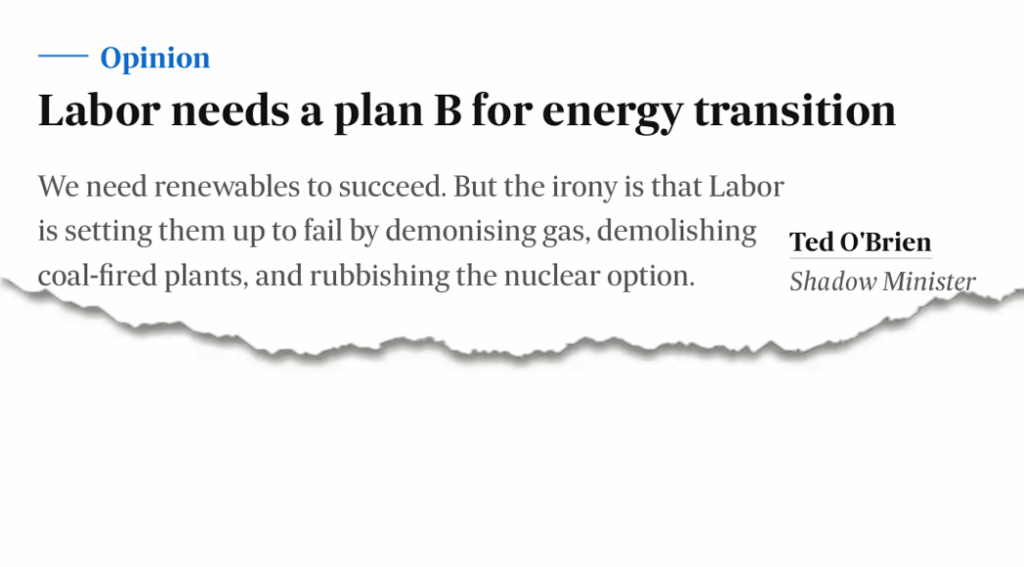As published in the Australian Financial Review, 6 December 2022
We need renewables to succeed. But the irony is that Labor is setting them up to fail by demonising gas, demolishing coal-fired plants, and rubbishing the nuclear option.
There’s an unwritten compact between government and the people when it comes to climate change in Australia, and Labor is set to break it. Most Australians want action on climate change, and they will support policies that deliver emissions reductions.
But threaten Australia’s economy, security or way of life, and all bets are off. This is where the federal Labor government is on shaky grounds. The starting point is power prices.
Despite Labor’s pre-election commitment to reduce household power bills by $275, energy prices are skyrocketing, and the budget forecasts increases of more than 56 per cent for electricity and 44 per cent for gas next financial year.
Some of Australia’s steelmakers and foundries have told me they may close, and the Australian Workers’ Union warns that up to 800,000 jobs are at risk.
Over time, Australia will reap what Labor is sowing, and the unwritten compact on climate change will unravel.
Not only does the government have no solution, but disunity around the cabinet table isn’t helping. Government ministers have been blaming everyone from gas companies to manufacturers to Vladimir Putin while floating thought bubbles ranging from new taxes to price caps and export levies.
Yet, it refuses to countenance working with industry to pump more gas into the system.
The government rejected gas from the capacity mechanism, ripped more than $50 million from the federal budget for gas exploration, and another $50 million for gas pipelines. It’s discouraging carbon-capture and storage and wants the Kurri Kurri [https://www.afr.com/link/follow-20180101-p5bw3j] plant in regional NSW converted away from gas as soon as possible.
In allocating almost $10 million to the Environmental Defenders Office [https://www.afr.com/link/follow-20180101-p5btf8], which makes vexatious legal claims against gas projects, the government’s ideological opposition to gas is clear.
On my first day as opposition spokesman on Climate Change and Energy, I wrote to the Minister for Climate Change and Energy, Chris Bowen, suggesting engagement with CEOs of gas companies. I even offered to assist. He refused.
Instead, Bowen undermined the Australian Domestic Gas Security Mechanism by calling it as “blunt as a basketball”, and then watched as Resources Minister Madeleine King botched a deal with gas companies leveraging the ADGSM.
Gas shortages are an early warning sign of looming energy security issues. I recently visited two coal-fired power stations soon to be decommissioned: Liddell in the Hunter Valley of NSW, which closes in April, and Yallourn in the Latrobe Valley of Victoria, which closes in 2028. I left both sites deeply worried about the bigger picture.
Set against a backdrop of increasing demand over coming years due to population growth and electrification, approximately 20 gigawatts of coal-fired generator capacity is due to close by 2035. That’s about 80 per cent of baseload capacity in the National Electricity Market gone without any guarantee of adequate replacements in time.
Making matters worse, Australia’s not mothballing these plants but demolishing them, leaving us with no plan B for when the government’s rollout of 82 per cent renewables fails.
The speed and scale of the government’s plan is unprecedented, requiring the installation of 22,000 solar panels every day and 40 wind turbines every month until 2030, along with tens of thousands of kilometres of transmission lines.
We need renewables to succeed, but the irony of the government’s plan is that it’s setting them up to fail.
The intermittency of wind and solar means they can’t survive without complementary technologies such as gas, which the government is killing off.
Nuclear energy could also partner with renewables – it’s the cleanest and safest form of energy on the planet – but the government refuses to even talk about it.
And when South Australian Labor Premier Peter Malinauskas says the opposition to nuclear power is “ideological”, Prime Minister Anthony Albanese and Environment Minister Tanya Plibersek line up to rubbish him to fend off the Green’s challenge in their inner-Sydney seats. As for the government’s claim that “renewables are the cheapest form of energy”, this is a gross representation that’s disproven each time a family or business opens a power bill.
With the market operator estimating the cost of network investments alone at $320 billion, users and taxpayers will pay more, not less.
Supply chain bottlenecks will inhibit the delivery of the government’s plan unless we increase our reliance on China which manufactures and, in many cases, mines and owns, the raw materials required to make solar panels and wind turbines.
Beyond power prices and energy security, there is another issue brewing in regional Australia: the lack of a social licence for the government’s renewables rollout.
I’ve visited home owners who will no longer overlook picturesque rolling hills, but industrial-scale solar farms. I’ve met residents decrying poor consultation and unfair compensation for transmission lines that will carpet their properties.
I have heard complaints about toxic, discarded solar panels, batteries and even wind turbine blades, with no waste management solution in sight.
I’ve also spoken with farmers worried about the sheer scale of agricultural land to be locked away.
The government fails to understand that a social licence is required for projects which have a material impact on local communities, their residents’ properties, or way of life.
Over time, Australia will reap what Labor is sowing, and the unwritten compact on climate change will unravel.
I just hope it won’t be too late to fix it.
Ted O’Brien is opposition spokesman for Climate Change and Energy.
Download a .pdf of this article HERE.
